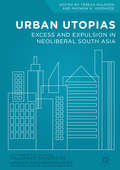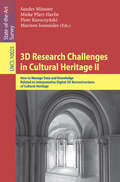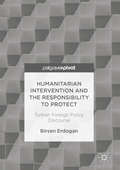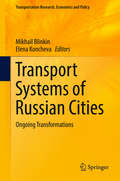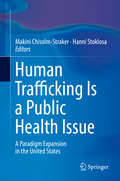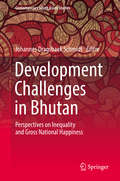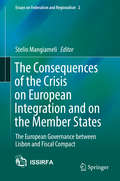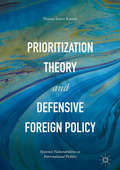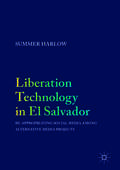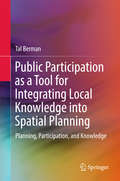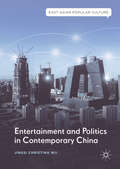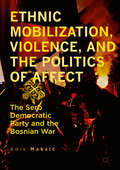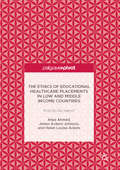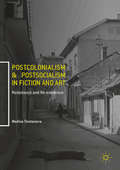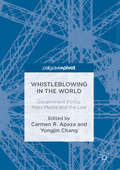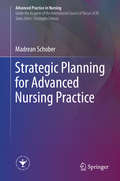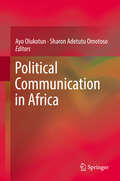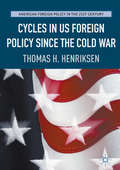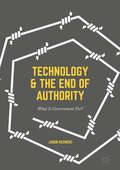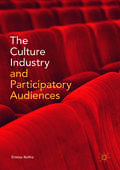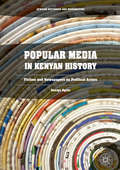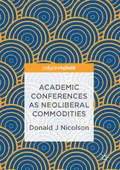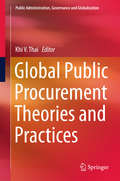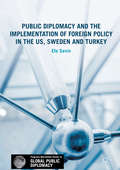- Table View
- List View
Urban Utopias
by Tereza Kuldova Mathew A. VargheseThis book brings anthropologists and critical theorists together in order to investigate utopian visions of the future in the neoliberal cities of India and Sri Lanka. Arguing for the priority of materiality in any analysis of contemporary ideology, the authors explore urban construction projects, special economic zones, fashion ramps, films, archeological excavations, and various queer spaces. In the process, they reveal how diverse co-existing utopian visions are entangled with local politics and global capital, and show how these utopian visions are at once driven by visions of excess and by increasing expulsions. It's a dystopia already in the making - one marred by land grabs and forced evictions, rising inequality, and the loss of urbanity and civility.
3D Research Challenges in Cultural Heritage II: How to Manage Data and Knowledge Related to Interpretative Digital 3D Reconstructions of Cultural Heritage (Lecture Notes in Computer Science #10025)
by Sander Münster Mieke Pfarr-Harfst Piotr Kuroczyński Marinos IoannidesThis book reflects a current state of the art and future perspectives of Digital Heritage focusing on not interpretative reconstruction and including as well as bridging practical and theoretical perspectives, strategies and approaches. Comprehensive key challenges are related to knowledge transfer and management as well as data handling within a interpretative digital reconstruction of Cultural Heritage including aspects of digital object creation, sustainability, accessibility, documentation, presentation, preservation and more general scientific compatibility. The three parts of the book provide an overview of a scope of usage scenarios, a current state of infrastructures as digital libraries, information repositories for an interpretative reconstruction of Cultural Heritage; highlight strategies, practices and principles currently used to ensure compatibility, reusability and sustainability of data objects and related knowledge within a 3D reconstruction work process on a day to day work basis; and show innovative concepts for the exchange, publishing and management of 3D objects and for inherit knowledge about data, workflows and semantic structures.
Humanitarian Intervention and the Responsibility to Protect
by Birsen ErdoganThis book offers a discursive analysis of the Turkish Foreign Policy on Humanitarian Interventions (HI) and the doctrine of the Responsibility to Protect (R2P). Across the chapters the author addresses important questions, such as: what is the position of the HI and R2P in the Turkish foreign policy discourse? Is there any variation between cases when it comes to the use of these concepts? How do these discourses shape/change/transform or sustain the Turkish identity? Despite the tendency in some countries to incorporate HI and R2P principles into their foreign policy (UK, Netherlands, Canada, Japan), and the fact that some countries are lobbying to make these principles a part of international or UN law, in the developing world these policies and concepts have not gained widespread recognition or approval. Countries like China, Brazil and India approach these concepts with suspicion or with reservation. The same tendency can be observed in the MENA region and in some parts of Africa and Asia. In this book, the author looks at the reasons behind these differences in approach and explores how the concept of identity affects Turkish foreign policy specifically. This study is invaluable for researchers and students of R2P and HI and foreign policy discourse in general.
Transport Systems of Russian Cities
by Mikhail Blinkin Elena KonchevaThis volume discusses post-socialist urban transport functioning and development in Russia, within the context of the country's recent transition towards a market economy. Over the past twenty-five years, urban transport in Russia has undergone serious transformations, prompted by the transitioning economy. Yet, the lack of readily available statistical data has led to a gap in the inclusion of Russia in the body of international transport economics research. By including ten chapters of original, cutting-edge research by Russian transport scholars, this book will close that gap. Discussing topics such as the relationship between urban spatial structure and travel behavior in post-soviet cities, road safety, trends and reforms in urban public transport development, transport planning and modelling, and the role of institutions in post-soviet transportation management, this book provides a comprehensive survey of the current state of transportation in Russia. The book concludes with a forecast for future travel development in Russia and makes recommendations for future policy. This book will be of interest to researchers in transportation economics and policy as well as policy makers and those working in the field of urban and transport planning.
Human Trafficking Is a Public Health Issue: A Paradigm Expansion in the United States
by Makini Chisolm-Straker Hanni StoklosaThis clear-sighted reference examines the public health dimensions of labor and sex trafficking in the United States, the scope of the crisis, and possibilities for solutions. Its ecological lifespan approach globally traces risk and protective factors associated with this exploitation, laying a roadmap towards its prevention. Diverse experts, including survivors, describe support and care interventions across domains and disciplines, from the law enforcement and judicial sectors to community health systems and NGOs, with a robust model for collaboration. By focusing on the humanity of trafficked persons, a public health paradigm broadens our understanding of and ability to address trafficking while adding critical direction and resources to the criminal justice and human rights structures currently in place. Among the topics covered:Children at Risk: Foster Care and Human TraffickingLGBTQ Youth and Vulnerability to Sex TraffickingPhysical Health of Human Trafficking Survivors: Unmet EssentialsResearch Informing Advocacy: An Anti-Human Trafficking ToolCaring for Survivors Using a Trauma-Informed Care FrameworkThe Media and Human Trafficking: Discussion and Critique of the Dominant NarrativeHuman Trafficking Is a Public Health Issue is a sobering read; a powerful call to action for public health professionals, including social workers and health care practitioners providing direct services, as well as the larger anti-trafficking community of advocates, prosecutors, taskforce members, law enforcement agents, officers, funders, and administrators. “An extraordinary collection of knowledge by survivors, academics, clinicians, and advocates who are experts on human trafficking. Human Trafficking is a Public Health Issue is a comprehensive offering in educating readers on human trafficking through a multi-pronged public health lens.”Margeaux Gray: Survivor, Advocate, Artist, Public Speaker
Development Challenges in Bhutan
by Johannes Dragsbæk SchmidtThis book provides essential insights into Bhutan's developmental challenges. It analyzes and scrutinizes the sovereign state's developmental approach, including the idea of Gross National Happiness (GNH), which has replaced Gross National Product (GNP) as a measurement of prosperity. The authors also explore and deconstruct ideational and cultural aspects of knowledge production and present a critical overall assessment of the political economy of education policy, health, ICT and migration in Bhutan. The book is divided into five parts all taking a critical approach towards inequality: Part one offers an assessment of Bhutan's developmental trajectories; part two deals with GNH, equality and inclusion versus exclusion; part three is devoted to culture, legal issues and the politics of chan≥ and part four to governance and integration; section five addresses health, food and disparities. This book will appeal to all scholars of South Asian affairs and development studies, as well as to diplomats and professionals involved in development aid.
The Consequences of the Crisis on European Integration and on the Member States
by Stelio MangiameliThe book examines the economic crisis in the European Union and its consequences for European integration and the member states. Discussing the provisions introduced by the Treaty of Lisbon, from the effects of macroeconomic monitoring to the restraints produced by the Fiscal Compact, it offers an analysis of the European Union's current situation and the effects of the measures adopted to manage the crisis, also making reference to how Europe is perceived by its citizens. Moreover, the chapters offer thoughts on the European integration process, in particular the effects that the policies adopted to tackle the crisis have had on the economic and financial sovereignty of the member states. This detailed examination of the situation of the EU between the Treaty of Lisbon and the Fiscal Compact is characterized by an original multidisciplinary approach that offers an articulate reflection on the criticalities that affect the actions of both European and national institutions.
Prioritization Theory and Defensive Foreign Policy
by Hanna Samir KassabThis book studies systemic vulnerabilities and their impact on states and individual survival. The author theorizes that the structure of the international system is a product of the distribution of capabilities and vulnerabilities across states. States function or behave in terms of these systemic threats. The author examines a number of specific case-studies focusing on military, economic, environmental, political and cyber vulnerabilities, and how different states are impacted by them. Arguing that current attempts to securitize these vulnerabilities through defensive foreign policies are largely failing, the books makes the case for prioritizing economic development and human security.
Liberation Technology in El Salvador
by Summer HarlowThis ethnographic study explores how four alternative media projects in El Salvador integrated digital technologies--particularly social media--into their practices, and whether incorporating these technologies affected citizen participation not only in the media production process, but in a broader discursive sphere of civic and political life as well. Summer Harlow investigates the factors that influence the extent to which alternative media producers are able to use digital tools in liberating ways for social change by opening a space for participation in technology (as content producers) and through technology (as engaged citizens). The book advances existing literature with two main contributions: extending our understanding of the digital divide to include inequalities of social media use, and including technology use--whether liberating or not--as a fundamental component of a mestizaje approach to the study of alternative media.
Public Participation as a Tool for Integrating Local Knowledge into Spatial Planning
by Tal BermanThis book provides a state of the art approach to participatory planning, and generates innovative thought in planning theory and knowledge study. The book introduces a new conceptual framework for participatory planning, one which redefines concepts that have been taken for granted for too long: those of "public participation" and "local knowledge". It draws on the rich repertoire of public participation practices that have developed globally over the last 50 years, and investigates the following questions: Which participatory practices most effectively capture residents' genuine spatial needs, perceptions and desires? And how can these be incorporated into actual plans? The book is based on an empirical comparative examination of the effectiveness of various participatory processes, and proposes practical solutions for public participation through two new instruments: the Practices Evaluation Tool, and the Participatory Methods Ladder. These instruments calibrate participation methods according to certain criteria, in order to improve their ability to extract local knowledge and incorporate it into planning deliverables. These new instruments correspond to and elaborate on Arnstein's ladder - the 1969 theoretical landmark for participatory planning. Both academics and practitioners in the area of urban and regional planning will find this book to be an invaluable resource, given the way it develops both theoretical and practical cutting-edge outcomes.
Entertainment and Politics in Contemporary China
by Jingsi Christina WuAs the rest of the world continues to pay keen attention to developments in China's politics, economy, and culture, this book advances research about China by providing an updated narrative of its entertainment life in the beginning of China's 21st century. Readers will gain insights about fascinating new developments in contemporary Chinese popular culture, including its reality television, family dramas centered around younger generations' life struggles, and social media. Furthermore, it will be the first book to apply the theoretical innovation of an aesthetic public sphere in examining closely the linkages between China's political life and activities in the country's culture sphere. As the concepts of public sphere and democracy largely took root in the West, this book argues that the case study of China promises valuable insights about entertainment's role in the formation of citizenship and building of a civil society, which remains a site of great contention in Western theories and empirical efforts.
Ethnic Mobilization, Violence, and the Politics of Affect: The Serb Democratic Party and the Bosnian War
by Adis MaksićThis book offers an unprecedented account of the Serb Democratic Party’s origins and its political machinations that culminated in Europe’s bloodiest conflict since World War II. Within the first two years of its existence, the nationalist movement led by the infamous genocide convict Radovan Karadzic, radically transformed Bosnian society. It politically homogenized Serbs of Bosnia-Herzegovina, mobilized them for the Bosnian War, and violently carved out a new geopolitical unit, known today as Republika Srpska. Through innovative and in-depth analysis of the Party’s discourse that makes use of the recent literature on affective cognition, the book argues that the movement’s production of existential fears, nationalist pride, and animosities towards non-Serbs were crucial for creating Serbs as a palpable group primed for violence. By exposing this nationalist agency, the book challenges a commonplace image of ethnic conflicts as clashes of long-standing ethnic nations.
The Ethics of Educational Healthcare Placements in Low and Middle Income Countries: First Do No Harm?
by Helen Louise Ackers James Ackers-Johnson Anya AhmedThis book is open access under a CC BY 4.0 license.This book examines the current state of elective placements of medical undergraduate students in developing countries and their impact on health care education at home. Drawing from a recent case study of volunteer deployment in Uganda, the authors provide an in-depth evaluation of the impacts on the students themselves and the learning outcomes associated with placements in low resource settings, as well as the impacts that these forms of student mobility have on the host settings. In addition to reviewing the existing literature on elective placements, the authors outline a potential model for the future development of ethical elective placements. As the book concurs with an increasing international demand for elective placements, it will be of immediate interest to universities, intermediary organizations, students as consumers, and hosting organisations in low-resource settings.
Postcolonialism and Postsocialism in Fiction and Art
by Madina TlostanovaThis book tackles the intersections of postcolonial and postsocialist imaginaries and sensibilities focusing on the ways they are reflected in contemporary art, fiction, theater and cinema. After the defeat of the Socialist modernity the postsocialist space and its people have found themselves in the void. Many elements of the former Second world experience, echo the postcolonial situations, including subalternization, epistemic racism, mimicry, unhomedness and transit, the revival of ethnic nationalisms and neo-imperial narratives, neo-Orientalist and mutant Eurocentric tendencies, indirect forms of resistance and life-asserting modes of re-existence. Yet there are also untranslatable differences between the postcolonial and the postsocialist human conditions. The monograph focuses on the aesthetic principles and mechanisms of sublime, the postsocialist/postcolonial decolonization of museums, the perception and representation of space and time through the tempolocalities of post-dependence, the anatomy of characters-tricksters with shifting multiple identities, the memory politics of the post-traumatic conditions and ways of their overcoming.
Whistleblowing in the World: Government Policy, Mass Media and the Law
by Carmen R. Apaza and Yongjin ChangThis book deploys an original comparative framework, as well as archival and pattern-matching research methodologies, to analyze whistleblowing cases from Peru, South Korea, Thailand and the United States of America and to ascertain factors that make for effective whistleblowing. After examining the cases, the study concludes that external whistleblowing, extensive mass media coverage, and strong evidence are essential components of effective whistleblowing. When there is a lack of proper legal protection, whistleblowers experience brutal retaliation, even though their actions are successful in stopping wrongdoing and promoting change in the public sector.
Strategic Planning for Advanced Nursing Practice (Advanced Practice in Nursing)
by Madrean SchoberThis eagerly anticipated book equips readers to understand the dynamics of policy processes, relevant decision-making and the significance of key decision-makers. It also emphasizes the usefulness of negotiation and diplomacy skills in order to support the development of an advanced nursing practice (ANP) initiative that involves the identification of pivotal issues to ensure that nurses unlock their full potential. Topics include a definition of strategic planning, essential factors to bear in mind, and frameworks to use in the context of formulating effective policies. By addressing outcome indicators and research, this volume offers a comprehensive approach to coordinated planning, and will appeal to advanced practice nurses, healthcare planners and policymakers, as well as administrators at hospitals and healthcare institutions.
Political Communication in Africa
by Ayo Olukotun Sharon Adetutu OmotosoThis book offers a comprehensive account of the nature and development of political communication in Africa. In light of the growing number of African states now turning towards democratic rule, as well as the growing utilization of information technologies in Africa, the contributors examine topics such as: the role of social media in politics, strategic political communication, political philosophy and political communication, Habermas in Africa, gender and political communication, image dilemma in Africa, and issues in political communication research in Africa, and identify the frontiers for future research on political communication in Africa.
Cycles in US Foreign Policy since the Cold War (American Foreign Policy in the 21st Century)
by Thomas H. HenriksenThis book describes how American international policy alternates between engagement and disengagement cycles in world affairs. These cycles provide a unique way to understand, assess, and describe fluctuations in America's involvement or non-involvement overseas. In addition to its basic thesis, the book presents a fair-minded account of four presidents' foreign policies in the post-Cold War period: George H. W. Bush, Bill Clinton, George W. Bush, and Barack Obama. It suggests recurring sources of cyclical change, along with implications for the future. An engaged or involved foreign policy entails the use of military power and diplomatic pressure against other powers to secure American ends. A disengaged on noninvolved policy relies on normal economic and political interaction with other states, which seeks to disassociation from entanglements.
Technology and the End of Authority
by Jason KuznickiThis book provides a critical survey of Western political philosophy from a classical liberal perspective, paying particular attention to knowledge problems and the problem of political authority. Its central argument is that the state is a tool for solving a historically changing set of problems, and that, as a tool, the state is frequently deficient on both moral and practical grounds. Government action can be considered as a response to a set of problems, all of which may conceivably be solved in some other manner as well. The book examines in particular the relationship between the state and technology over time. Technological developments may make the state more or less necessary over time, which is a consideration that is relatively new in the history of political philosophy, but increasingly important. The book is organized chronologically and concludes with an essay on trends in the history of political philosophy, as well as its surprisingly bright prospects for future development.
The Culture Industry and Participatory Audiences
by Emma KeltieThis project offers a new critique of participatory media practices. While the concept of participatory culture is often theorised as embodying the possibility of a potentially utopian future of media engagement and participation, this book argues that the culture industry, as it adapts and changes, provides moments of authorised participation that play out under the dominance of the industry. Through a critical recounting of the experience of creating a web series in Australia (with a global audience) outside of the culture industry structures, this book argues participation can take place. It is these platforms that become spaces of controlled access to participatory cultural practices.
Popular Media in Kenyan History
by George OgolaThe book examines popular fiction columns, a dominant feature in Kenyan newspapers, published in the twentieth century and examines their historical and cultural impact on Kenyan politics. The book interrogates how popular cultural forms such as popular fiction engage with and subject the polity to constant critique through informal but widely recognized cultural forms of censure. The book further explores the ways we see and experience how the African subaltern, through the everyday, negotiate their rights and obligations with the self, society and the state. Through these columns and their writers, the book examines the tensions that characterize such relationships, how the formal and informal interpenetrate, how the past and present are reconciled, and how the local and transnational collide but also collude in the making of the Kenyan identity.
Academic Conferences as Neoliberal Commodities
by Donald J NicolsonThis book empirically examines academic conferences in the social sciences, and explores the purpose and value of people interested in the social sciences attending and presenting at national and international academic conferences. Using a highly original structure and style, the book considers the damaging impact of neoliberalism on conferences, and academia more widely, and explores the numerous barriers to conference attendance. It will be of interest to students and researchers who attend conferences in fields spanning the social sciences, as well as those interested in the effects of neoliberalism on academia.
Global Public Procurement Theories and Practices
by Khi V. ThaiThis book discusses current theories and practices in the field of public procurement. Over the past few decades, public procurement has had to evolve conceptually and organizationally in the face of unrelenting budget constraints, government downsizing, public demand for increased transparency in public procurement, as well as greater concerns about efficiency, fairness and equity. Procurement professionals have also had to deal with a changeable climate produced by emerging technology, environmental concerns, and tension between complex regional trade agreements and national socioeconomic goals. This volume presents sixteen case studies focusing on the themes of public procurement as a policy tool and performance-based public procurement. The first section discusses public procurement as a policy tool and the challenges involved in balancing the competing interests of market forces, legal requirements, political pressures, and environmental concerns. The second section discusses performance-based public procurement, highlighting the frameworks used to assess procurement systems, the gaps between policy and practice, and strategies for bridging those gaps. The final section of the book discusses current issues in procurement, such as the TTP, risk mitigation, and procurement as a profession. By combining theory and analysis with evidence from the real world, this book is of equal use to academics, policy makers, and procurement professionals.
Public Diplomacy and the Implementation of Foreign Policy in the US, Sweden and Turkey
by Efe SevinThis book presents a comprehensive framework, the six pathways of connection, which explains the impact of public diplomacy on foreign policy by studying how a public diplomacy project is designed to contribute to the achievement of a related foreign policy goal. Based on a comparative study of three important public diplomacy practitioners with distinctive challenges and approaches-the US, Sweden, and Turkey-the book shows the necessity to move beyond soft power to appreciate the role of public diplomacy in global politics. First, the author lays the theoretical foundations of the framework through a survey of scholarly works related to public diplomacy. He then further develops it by analyzing how the American, Swedish, and Turkish practitioners design and implement their public diplomacy projects. Finally, the book explains how the framework can be used to design new public diplomacy projects and measure their impact on foreign policy.
Public Diplomacy and the Implementation of Foreign Policy in the US, Sweden and Turkey (Palgrave Macmillan Series in Global Public Diplomacy)
by Efe SevinThis book presents a comprehensive framework, six pathways of connection, which explains the impact of public diplomacy on achieving foreign policy goals. The comparative study of three important public diplomacy practitioners with distinctive challenges and approaches shows the necessity to move beyond soft power to appreciate the role of public diplomacy in global politics. Through theoretical discussions and case studies, six pathways of connection is presented as a framework to design new public diplomacy projects and measure their impact on foreign policy.
